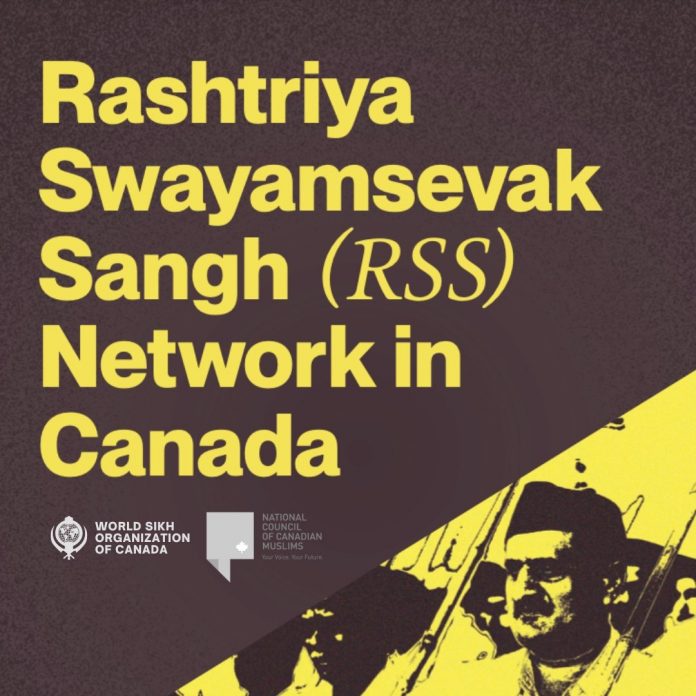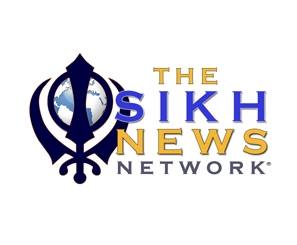TORONTO, CANADA – As Canadian officials begin meetings at the G20 Summit hosted by India, the National Council of Canadian Muslims (NCCM) and the World Sikh Organization of Canada (WSO) launch a major report—The RSS Network in Canada—that looks at the Rashtriya Swayamsevak Sangh (RSS), its supremacist ideology, and its influence network in Canada.
![]()
The report – the first of its kind – tells a Canadian story, one that far too few Canadians are aware of, about the RSS network’s affiliates and groups, their work, and their place as part of the Canadian fabric. Their presence and work poses a challenge to tolerance, pluralism, and liberal democracy in Canada.
![]()
The RSS is one of the most powerful non-governmental groups in the world, founded in 1925 with the expressed goal of reshaping India into a country run by and for its Hindu majority. This far-right ideology of “Hindu nationalism,” otherwise called Hindutva, has the primary purpose of establishing a Hindu Rashtra, or a Hindu State. This is an intolerant ideology that relegates India’s diverse array of minorities, from Muslims to Dalits to Christians to Sikhs to Jains, into inferior status. The RSS’s early ideologues were inspired by Hitler and Nazi ideology.
RSS groups have helped carry out mass violence in India, including the 2002 Gujarat massacre that killed thousands of Muslims. But its victims are not limited to India’s Muslims, or a few minority groups. The RSS vision for India would push all of India’s minorities into inferior status. This includes the Sikh community, hailing primarily from the state of Punjab, which formed a big part of the Farmers’ Protests we saw in recent years. The Sikh community also has well established diasporas, the largest of which is in Canada.
Even Dalit groups do not escape the RSS’s discrimination. The Dalit community (pejoratively called “untouchables”) face systemic discrimination by RSS related groups, such as the inability to move up in rank within various institutions in India.
The rhetoric and ideas that push these divisions are being spread inside Canada, our civil society, and our institutions.
The RSS purports to represent all Hindus and Hinduism, a vast and heterogeneous world religion that encompasses over a billion adherents. The RSS is politicizing the religion into an ideology that marginalizes India’s minority groups. This matters to Canada. The RSS network of groups has long been at work as part of Canadian society to organize the Indo-Canadian diaspora, and even to interfere in Canadian institutions and communities.
Describing the workings of this network in various sectors—the humanitarian relief space, the education system, and the political advocacy space—is the main focus of our report.
“The report looks at the RSS network’s humanitarian charities in Canada, its presence in Canada’s schools, and its political advocacy,” says NCCM spokesperson, Steven Zhou. “It also includes a list of incidents where Islamophobic, anti-Sikh, and other discriminatory rhetoric has been connected with those who purport to represent the Hindu or Indo-Canadian community.”
“The story this report uncovers becomes even more important as Canada engages India, run by life-long RSS member PM Narendra Modi, and the Bharatiya Janata Party (BJP), one of the RSS’s main political arms,” shares the WSO’s Jaskaran Sandhu. “As our elected officials land in India for the G20 Summit and contemplate further ties with India through the Indo-Pacific Strategy, Canadians deserve to understand the dangerous exclusionary and discriminatory ideas that the RSS stands for, and which its network, including the BJP, acts upon.”
We’ve already seen the results play out in India: the annexation of Kashmir, anti-Muslim pogroms in New Delhi, violence against Sikh protestors, the bulldozing of protestors’ homes, etc. Many BJP officials have helped carry out this violence inside India, or have egged on the tensions with violent rhetoric. This has included calls for ethnic cleansing and even genocide.


